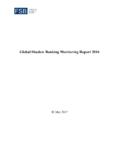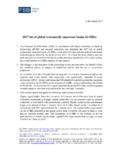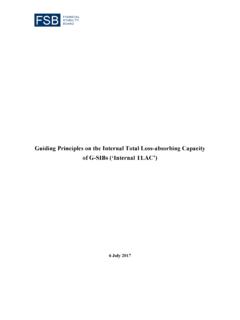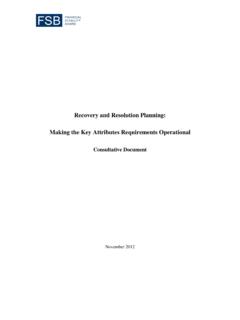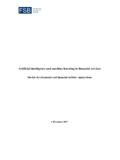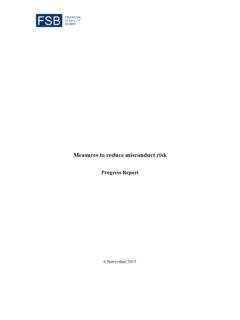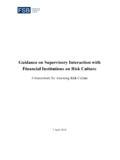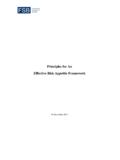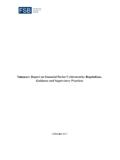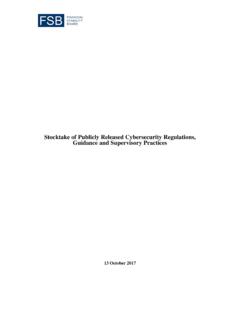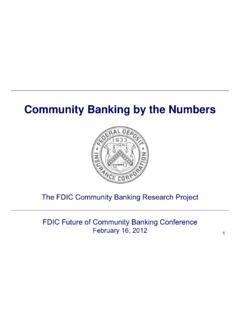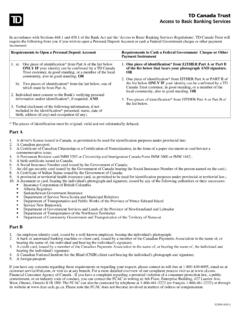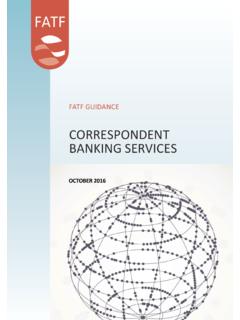Transcription of FSB action plan to assess and address the decline in ...
1 FSB action plan to assess and address the decline in correspondent banking Progress report to G20 Summit of November 2018 16 November 2018 The Financial Stability Board (FSB) is established to coordinate at the international level the work of national financial authorities and international standard-setting bodies in order to develop and promote the implementation of effective regulatory, supervisory and other financial sector policies. Its mandate is set out in the FSB Charter, which governs the policymaking and related activities of the FSB.
2 These activities, including any decisions reached in their context, shall not be binding or give rise to any legal rights or obligations under the FSB s Articles of Association. Contacting the Financial Stability Board Sign up for e-mail alerts: Follow the FSB on Twitter: @FinStbBoard E-mail the FSB at: Copyright 2018 Financial Stability Board. Please refer to: iii Content Page Executive Summary .. 1 1. Data collection and analysis to further examine the dimensions and implications of the issue .. 6 A. Update to the Correspondent banking Data Report published by the FSB .. 6 B. Ongoing monitoring of trends in correspondent banking .
3 8 C. Other analyses of correspondent banking .. 9 2. Clarifying regulatory expectations .. 9 3. Domestic capacity-building in jurisdictions that are home to affected respondent banks 11 4. Strengthening tools for due diligence by correspondent 13 A. Progress in the implementation of CPMI recommendations and next steps .. 14 B. Potential public sector involvement in other technical solutions .. 17 C. Potential applications of financial technologies .. 17 5. Monitoring of recommendations to improve remittance service providers access to banking services .. 17 iv 1 FSB action plan to assess and address the decline in correspondent banking Progress report to G20 Summit of November 2018 Executive Summary The decline in the number of correspondent banking relationships in many countries around the world remains a source of concern for the international community because, in affected jurisdictions, it may impact the ability to send and receive international payments, or drive some payment flows underground, with potential adverse consequences on growth, financial inclusion and international trade.
4 While impacts to the stability and integrity of the global financial system have not been identified, concerns remain at the national and regional level. The Financial Stability Board (FSB) launched in November 2015 a four-point action plan1 to assess and address the decline in correspondent banking relationships, coordinated by a Correspondent banking Coordination Group (CBCG)2. The four areas of the action plan are: Further examining the dimensions and implications of the issue; Clarifying regulatory expectations, as a matter of priority, including through guidance by the Financial action Task Force (FATF) and the Basel Committee on banking Supervision (BCBS); Domestic capacity-building in jurisdictions that are home to affected respondent banks; Strengthening tools for due diligence by correspondent banks.
5 This is the fifth progress report under the The international components of the action plan are now largely in place. To be effective, the solutions designed by international standard setting bodies and industry organisations need to be implemented in practice by national authorities and banks. The CBCG will also continue to assess the changes in correspondent banking activity, monitor the effective implementation of the action plan components, and facilitate the effective delivery of technical assistance (TA) to countries in need of improving their domestic frameworks on Anti-Money Laundering and Countering the Financing of Terrorism (AML/CFT).
6 1 of 6 November 2015. 2 The CBCG s membership comprises senior representatives from international organisations and standard setters and national authorities in the FSB and its Regional Consultative Groups. 3 The previous progress reports, for August 2016, December 2016, July 2017 and March 2018, are available on the FSB website. 2 The actions taken since the previous progress report in March 2018 include: Data collection and analysis The FSB published on 16 November 2018 an update of its correspondent banking data report, using data provided by SWIFT as of end-2017, including some methodological The decline in the number of active correspondents, as measured by the flow of messages, continued in 2017, with a year-on-year reduction of at the global level, affecting 21 out of 22 regions, and accelerating in 16 of them.
7 The pace of decline increased for the three major international currencies. At the global level, the decline in the number of active correspondents has not resulted in a lower number of payment messages (volume) or a lower underlying value of the messages processed through SWIFT, but in a reduction in direct flows of payment messages between some countries, and increased concentration of correspondent activity in the most active corridors. The World Bank has published country case studies that provide more qualitative detail regarding the impact of the decline of correspondent banking and complement the quantitative evidence presented in the correspondent banking data report.
8 Clarifying regulatory expectations The FATF and BCBS conducted surveys of their membership to assess the transmission and traction of the FATF guidance on correspondent banking and the revised BCBS guidance on correspondent banking . FATF discussed the outcome of that work at its Plenary meeting in June 2018. A large proportion of the private sector entities surveyed by the FATF stated they had received communication from their regulators/supervisors at least on one of the elements of the FATF/BCBS Guidance, and over 20 FATF members have taken concrete actions to communicate the new guidelines, including changing legislation in one case, and updating guidance in six cases.
9 Although some correspondent banks did not receive any communications from supervisors and were not aware of any of the Guidance documents and some large providers of correspondent banking services did not observe changes in the supervisory approach following the communication of the Guidance. While the survey shows overall a high level of dissemination of the Guidance, some national authorities may need to do more. The reduction in correspondent banking relationship may affect trade finance transactions that rely on correspondent banking arrangements to be processed, which may have an impact on less-developed countries that are reliant on vulnerable correspondent banking relationships for access to basic supplies and to support development.
10 The FSB started exploring, with inputs from the World Trade Organization (WTO) and the International Finance Corporation (IFC), whether and how some of the solutions already developed can be further elaborated to better capture the trade finance components of correspondent banking . To that end, the Asian Development Bank (ADB) is collecting from industry examples of cases specific to trade finance, where additional clarifications of regulatory expectations in correspondent banking could be needed. 4 Available at: 3 Domestic capacity building The CBCG convened a workshop on 25 October 2018 on coordination and prioritisation of the capacity development needed to strengthen domestic AML/CFT supervision.
